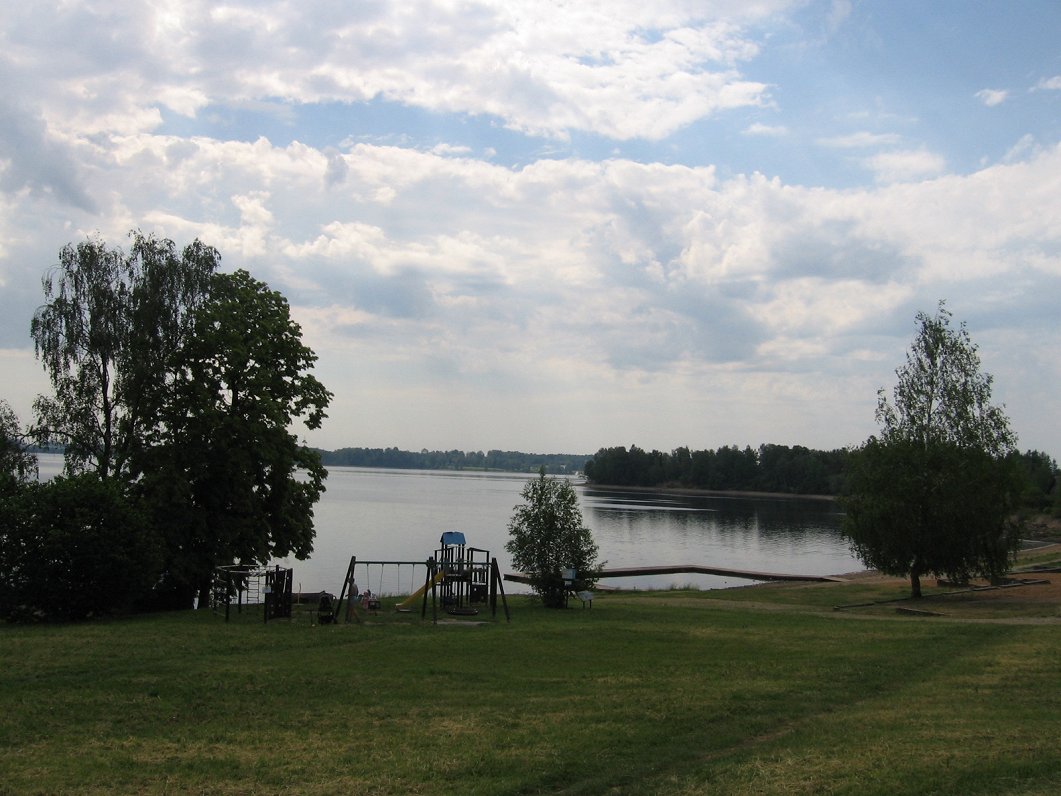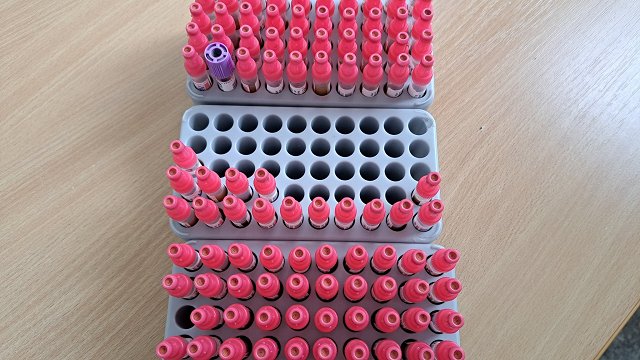Every year, the bathing season officially opens in May, when the Blue Flag is raised on Latvian beaches. It is a widely recognized local and international quality mark, indicating excellent water quality and safe recreation in a clean and tidy environment.
The only beach in Zemgale to have been awarded the Blue Flag for 15 years is Jēkabpils Radži water reservoir. It is located in the southern part of Jēkabpils and was created in 1987 after a dolomite quarry was flooded. This year, the bathing season has started earlier than usual due to the hot weather. Lifeguards are also on duty at the beach.
"They are on duty for 12 hours, from 9 am to 9 pm. There are four lifeguards, two per shift," says Ainārs Iesalnieks, the owner of the Radži Reservoir at the Jēkabpils Sports Centre.
Lifeguards are essential, although there has been no need to rescue anyone on this beach so far. "Not in our surveillance area, but somewhere nearby there have been people who have drowned. Last year there were probably even two cases. We also try not to let drunk people on the boats, to keep the beach clean, not to throw litter on the beach," Iesalnieks said.
Latvia joined the international Blue Flag program 26 years ago, and the program is managed by the Foundation for Environmental Foundation, which aims to promote sustainable development. To obtain the Blue Flag, municipalities must meet 33 criteria.
When asked which criteria are the most difficult for municipalities to meet, Jānis Ulme, the head of the Foundation, explains:
"The 33 criteria can be divided into four different groups. One is water quality, the second is environmental information and education, the third is safety and service, and the fourth is environmental management. The most expensive costs to be planned for the municipality would be waste management, infrastructure maintenance, and rescue service. And, of course, only places with excellent water quality can apply for Blue Flag status, which is the highest category possible under European legislation, and not all beaches are able to provide it. And these are sometimes factors that are not directly dependent on the day-to-day work of the municipality and that can involve much higher costs to tackle the causes of pollution."
Latvia has 12 Blue Flag beaches and one marina this year. Jānis Ulme believes this is too few.
"We have far too few of these places. Every municipality could have, say, at least one safe, well-maintained place. But Latvia's problem is a bit broader - Latvia actually has the lowest number of official bathing places per capita of any European country.
"We have one or two more per season, but that is far too few, because we can talk about recreational places, we can talk about the fact that Latvians like to swim where there are no people, but if we look at the "black statistics" we have with bathing and water safety, then unfortunately that is one of the factors. People do not have [official] bathing spots."
What can municipalities do?
According to the Cabinet of Ministers, lifeguards are only obligatory on Blue Flag beaches. Other municipalities can do what they can, but what can be done with limited resources?
The association "Swim Safely" in Pierīga is installing stands with swimming rules and lifebuoys, and Zane Gemze, the association's manager, recommends that municipalities first survey the most popular swimming areas.
"First of all, what is the bed like, is the entrance smooth and gentle, if not, can you do anything there? Are there rocks, overgrowth, rapids in the river? Considering these things, which in fact do not cost anything in the first place, you can understand what it is that the municipality can do," says Zane Gemze.
It would be important to put up buoys showing safe depths. "It doesn't cost much and shows the public where the line is, what is safe or not safe," she adds.
Apart from the 12 Blue Flag beaches, Latvia has only 59 official bathing sites.
Why are municipalities not more active in ensuring safe water recreation for their citizens, and is the reason a lack of money? Jānis Ulme, head of the Foundation for Environmental Education, says that the state does not know how to thank municipalities for their work and that there are no incentive mechanisms.
"The only thing we have in Latvia at the moment is a minimum number of free water quality tests. That is also a lot, but we could also motivate and talk to the municipalities to increase this number," says Jānis Ulme.
Providing lifeguards at bathing sites requires a lot of financial and human resources, but, according to Jānis Ulme, safety can be thought of in different ways.
"First, by assessing the risks. If seven people a day come there, it is hardly possible for the municipality to maintain two lifeguards for the season and still find them. So safety either through first aid equipment and lifesaving equipment, an easily accessible place for services, or at least beach attendants with additional training in at least minimum assistance," says Jānis Ulme.
We are also responsible for our own safety on the water, says Zane Gemze, head of the association "Swim Safely":
"We don't swim in the rain, wind, at night, in thunderstorms. Parents often ask how old a young person can swim alone, and I say never. Just like adults, we don't recommend going swimming alone, because if one of us is unwell or needs to call for help, the other can help. [...] Alcohol and water are incompatible."
A person can drown in 30 seconds.
As reported numerous times over the years by LSM, in Latvia, the number of drownings is decreasing but still grim. Twice as many men as women drown every year and more than half of those who drown are under 25.






























